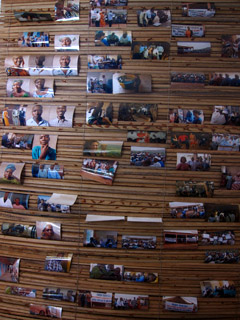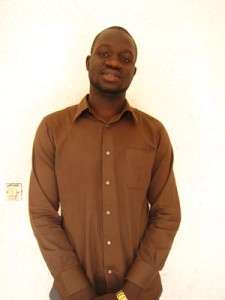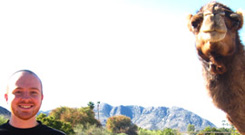
Mali Health Organizing Project (MHOP) takes a unique approach to public health. Instead of trying to implement a pre-formulated plan to improve a community’s access to health care, MHOP asks the community what their needs are, and what they consider to be possible solutions. MHOP then works with the community to generate a health care plan from within, one that makes sense to the people that will be using it.
The residents of Sikoro-Sourakabougou, two largely marginalized quarters of Bamako, benefit from few public services. The roads leading into the communities are unpaved and cratered. Prior to MHOP, many women opted to deliver babies in their homes, rather than risk the 5 mile trip to the nearest clinic. Chief nurse of the MHOP clinic that started in April 2010, Adam Traore, notes that prior to the MHOP clinic, many women did not want to ride in a shaking and unsteady car on the rocky roads all the way to the downhill clinic. I gave birth at home in Sourakabougou several times without medical assistance because the closest clinic was about 5 miles away. (see the rest of her interview here)
After surveying the community, a clinic was the first priority. But MHOP did more than build a clinic. Here are a few of the unique features of the 7 room clinic that provides treatment and prevention for 52 health problems and diseases, serving a population of approximately 35,000:
* Government and community co-funding. Instead of building a clinic without local support, we organized the community to secure government involvement. In addition, Sourakabougou neighborhood residents donated close to $1,000, a huge sum in the local currency.
* Community management. Neighborhood residents elected a committee to run the clinic, developed an architectural plan for construction, secured a piece of public land for the project, fundraised for construction costs, supervised the hiring of medical personnel, and now oversee the operations of the clinic!
* New healthcare delivery methods. Our clinic will test new tactics to improve the coverage and quality of care, including malnutrition and malaria treatment. MHOP will also use this clinic as a trial site for innovative health-financing and technological interventions to improve health access and to reduce child morbidity and mortality.
In addition to the clinic, MHOP has started a community health radio project and they have created an active team of community health workers, who visit families in their homes, providing care, education and if necessary, referrals to the clinic (the photo at the top of this post is a collage of MHOP’s community health workers). MHOP subsidizes the health care costs for many of the residents of Sikoro-Sourakabougou, and care is completely free for the poorest members of the community. In return, those residents are asked to participate in community health actions, such as volunteering for community health education programs.
From their website: …we [MHOP] work as a catalyst to bring residents and their government together to address the most basic causes of illness and mortality. Our programs embrace innovative solutions to expand access to primary healthcare services, increase community governance, and ensure individual empowerment.
 MHOP is the kind of program that flies under the radar. You don’t hear about them because they are not running an expensive PR campaign. They are not working out of a big office. They are doing the work. Every day.
MHOP is the kind of program that flies under the radar. You don’t hear about them because they are not running an expensive PR campaign. They are not working out of a big office. They are doing the work. Every day.
I was fortunate to meet with Adama Kouyate (pictured at left), the Programs Manager at MHOP, to talk in more detail about MHOP’s work, challenges and vision for the future. The interview is broken up over several parts in the videos below. Of course, I also made sure that Adama had a camel drawing workshop before I left (see the results in the last video).
Be sure to check out MHOP’s website at malihealth.org. Also, I strongly encourage you to donate to their summer matching campaign. Any donation goes a long way and in this case it goes even further because of the matching funds. MHOP is innovative and inclusive, but most importantly, they are effective. If you want your money to make an impact, click here. I will also be donating any and all funds received from purchases of the How to Draw Camels Ebook and camel merchandise to MHOP from now until August 12th.
Interview Part 1: Adama introduces himself, explains how he started working with MHOP and what he does there now.
link: http://www.youtube.com/watch?v=E4cf9EVrabo
Interview Part 2: MHOP’s programs and an explanation of community health actions, which act as a form of payment for health care.
link: http://www.youtube.com/watch?v=GeMK-pqdcyo
Interview Part 3: MHOP’s challenges: funding, sustaining community engagement; student involvement in MHOP’s programs; health radio listening groups; civic engagement around health and otherwise.
link: http://www.youtube.com/watch?v=uf1BvywuokI
Interview Part 4: MHOP’s vision for the future; involvement of Malian government; sources of funding; the difference between MHOP’s programs and those of the Malian Health Ministry.
link: http://www.youtube.com/watch?v=jRMdGUMYvc4
Interview Part 5: Camel drawing..
link: http://www.youtube.com/watch?v=kRJDA7cMrys
Thank you Adama and thank you MHOP! Once again, check out MHOP’s website at malihealth.org and don’t forget their summer matching campaign!! Whether or not you donate, spread the word about Mali Health Organizing Project, few organizations are doing such meaningful and effective work.


{ 3 trackbacks }